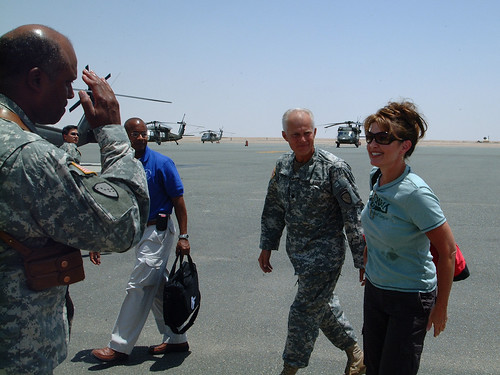I’m doing this for my own benefit, as I’ve not followed the goings on in the Republic of Georgia, except to note when it’s in the news, not our Georgia.
April 18, 2008
Georgia sought the backing of NATO and the European Union on Friday after Russia stepped up pressure by announcing intensified ties with two separatist Georgian regions.
Georgia’s Vice Prime Minister Giorgi Baramidze called Russia’s action “very, very, very dangerous.”
“It is a decisive moment,” said Georgia’s Vice Prime Minister Giorgi Baramidze. “Russia has crossed the red line and Europe and the Euro-Atlantic community must react.”
April 22, 2008
Georgia has asked the U.N. Security Council to discuss Russia’s “military aggression” after saying a Russian jet shot down one of its unmanned spy planes.
“We call upon the United Nations to address this direct military aggression against Georgia and to fully exploit its own means and capabilities in order to keep the situation from further escalation,” Georgia’s U.N. Ambassador Irakli Alasania told reporters Monday.
To bolster its case, the Georgian air force released a video that it says shows a twin-tailed Russian MiG-29 shooting down a Georgian unmanned aerial vehicle, or UAV, over the separatist region of Abkhazia on Sunday.
April 23, 2008
Tensions have been escalating between Georgia’s pro-Western government and Russia, which is providing assistance to Abkhazia and another breakaway region, South Ossetia.
Georgian forces fought separatists in Abkhazia before the ceasefire was negotiated more than a decade ago.
Last week, Moscow formalized relations with the territories and withdrew trade sanctions while expanding “trade, economic, social, scientific and technical, information, cultural, and educational” contacts with them, Russia’s Itar-Tass news agency reported.
April 29, 2008
Russia is increasing the number of its troops near the region of Abkhazia amid simmering tensions between Russia and Georgia, the Defense Ministry announced Tuesday.
Georgians protest outside the Russian Embassy in Tbilisi on April 25, 2008.
A statement posted on the ministry’s Web site said the increase of what it called peacekeepers was in response to a Georgian troop buildup.
“Georgia is increasing its group of forces in close vicinity to the conflict zones,” and there have been “threats to use military force and provocations on behalf of Georgian authorities,” the statement said, according to a CNN translation.
July 4, 2008
Georgia and its breakaway region of South Ossetia offered differing accounts Friday of a shooting that highlights continued tension between them amid Georgia’s NATO ambitions.
South Ossetians stand in the street during a night of shelling in Tskhinvali.
South Ossetians stand in the street during a night of shelling in Tskhinvali.
South Ossetia said shootings Thursday night in the regional capital of Tskhinvali and surrounding areas killed two people and wounded 11 in what a South Ossetian government spokeswoman called a Georgian “military provocation,” according to a report on Russia’s state Interfax news agency.
A Georgian defense official, however, denied that Georgian troops even fired a shot, though they were fired upon, and said the incident is part of ongoing provocation by South Ossetian separatists.
August 2, 2008
Six people were killed and 13 wounded in the shelling of South Ossetia by Georgian forces, South Ossetian officials said Saturday, according to Russia’s Interfax news agency.
Officials of the breakaway Georgian region said the shelling was part of a Georgian military operation, Interfax reported.
Georgia initially suggested Russian peacekeepers were to blame, drawing heated denials from the Russian Defense Ministry, which called the allegation “dirty informational provocation.”
Later, however, Mamuka Kurashvili, the commander of Georgian peacekeeping operations, told reporters that four people were wounded when several Georgian villages were fired upon from South Ossetia, and Georgia “had to return fire.”
August 7, 2008
Georgia’s president on Thursday ordered his country’s forces to cease fire in South Ossetia, the separatist region where days of sporadic clashes have raised fears of full-scale war.
President Mikhail Saakashvili announced the order in a television broadcast in which he also urged South Ossetian separatist leaders to enter talks on resolving the conflict.
He proposed that Russia could become a guarantor of wide-ranging autonomy for South Ossetia, if the region remains under Georgian control.
Russia has close ties with the separatist leadership, and Georgian officials have alleged that Moscow is provoking the recent clashes.
August 8, 2008
Intense fighting reportedly raged for a second night in the Georgian separatist region of South Ossetia on Saturday and Georgia’s interior ministry reported air attacks on three military bases and key facilities for shipping oil to the West.
Interior Ministry spokesman Shota Utiashvili said the Vaziani military base on the outskirts of the Georgian capital was bombed by warplanes during the night and that bombs fell in the area of the Baku-Tbilisi-Ceyhan oil pipeline.
He also said two other Georgian military bases were hit and that warplanes bombed the Black Sea port city of Poti, which has a sizable oil shipment facility.
Utiashvili said there apparently were significant casualties and damage in the attacks, but that further details would not be known until the morning.
Russia dispatched an armored column into South Ossetia on Friday after Georgia, a staunch U.S. ally, launched a surprise offensive to crush separatists. Witnesses said hundreds of civilians were killed.
August 9, 2008
Russian forces launched an airstrike against a military airfield near the Tbilisi International Airport early Sunday, despite international calls for Russia to stand down from the escalating conflict, Georgian officials told CNN.
The attack near the Georgian capital city came after a day of intense fighting in the former Soviet republic, with dozens of Russian warplanes bombing civilian and military targets in Georgia on Saturday.
As many as 2,000 people had been killed in the capital of separatist Georgian province South Ossetia, according to a Russian ambassador.
“The city of Tskhinvali no longer exists. There is nothing left. It was wiped out by the Georgian military,” the Russian news agency Interfax said, quoting the Russian ambassador to Georgia, Vyacheslav Kovalenko.
August 11, 2008
As fighting continued Sunday between Russia and Georgia over the separatist province of South Ossetia, U.N. officials expressed concern about violence in another Russian-backed breakaway territory in Georgia.
Forces of Abkhazia launched air and artillery strikes on Georgian troops Sunday, intending to drive them out of a small part of Abkhazia that the Georgians controlled, The Associated Press reported.
U.N. Assistant Secretary-General Edmond Mulet said Russian personnel and weapons were part of a military buildup in Abkhazia’s capital, Sukhumi. The Georgian government said 4,000 Russian troops have landed in Abkhazia, according to the AP.
Also Sunday, bombing was reported in the Georgian city of Zugdidi, south of the Abkhaz border, “causing panic among the civilian population,” Mulet said. Information on casualties and who was responsible for the bombing wasn’t available.

Sphere: Related Content








